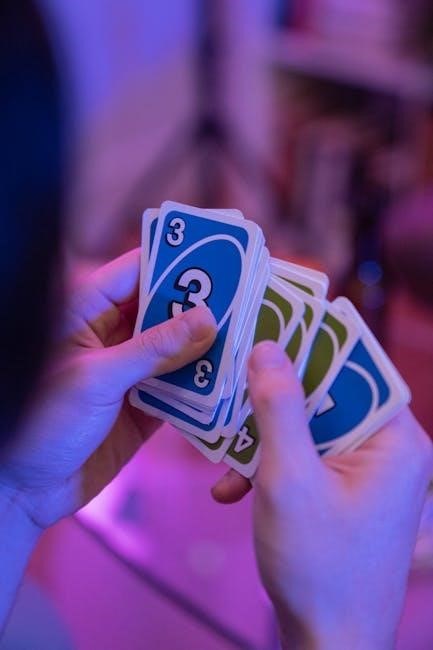FTC Game Manual Part 1 provides foundational rules, gameplay details, and team eligibility criteria for the competition. It outlines the inspection process and robot construction guidelines, ensuring safety and fairness. The manual is essential for teams to understand competition structure, scoring, and awards. Regular updates and clarifications are available through the Q&A forum.
Overview of the FTC Program
FTC (FIRST Tech Challenge) is a premier robotics competition for students, fostering STEM education through innovative robot design and teamwork. Founded by Dean Kamen, it inspires young minds to pursue science and technology careers. Teams collaborate to build robots, competing in challenges that emphasize engineering, programming, and problem-solving. FTC promotes Gracious Professionalism, encouraging respect, kindness, and sportsmanship among participants, creating a supportive and inclusive community.
Structure and Purpose of the Game Manual
The FTC Game Manual is divided into two parts, with Part 1 detailing foundational rules, game structure, and eligibility criteria. It outlines competition format, safety guidelines, and inspection processes, ensuring a fair environment. Regular updates are released, and clarifications are provided through the Q&A forum. This structure ensures all teams are aligned with the latest rules and requirements, fostering a competitive yet collaborative atmosphere.
Game Structure and Components
The FTC Game Manual Part 1 outlines the structure of traditional and remote events, detailing key game components and rules essential for competition. It ensures clarity and consistency for teams, covering foundational elements necessary for a fair and organized gameplay experience.
Key Elements of the Game
The FTC Game Manual Part 1 details the core gameplay rules, including robot movement, scoring elements, and field interactions. It outlines match play rules, penalties, and safety protocols to ensure fair competition. Teams must adhere to these guidelines to participate effectively and avoid disqualification. Understanding these elements is crucial for strategic planning and successful gameplay execution.
Traditional vs. Remote Events
Traditional events involve in-person competition, fostering face-to-face interaction and real-time problem-solving. Remote events allow virtual participation, enabling teams to compete from anywhere. Both formats adhere to the same core rules and objectives, ensuring consistency and fairness. The choice between traditional and remote events depends on team preferences, logistical constraints, and the ability to engage effectively in either setting.

Robot Design and Compliance
Robot design must adhere to specific rules and material guidelines outlined in the FTC Game Manual Part 1 to ensure safety, fairness, and competition integrity.
Inspection Process and Requirements
The inspection process ensures robots meet safety and technical requirements, using checklists in Appendices B and C. It is pass/fail, focusing on compliance with rules and proper documentation.
Failure to pass inspection prevents participation in matches. Teams must address issues promptly and re-inspect. Compliance ensures fair competition and safety for all participants, aligning with FTC standards and guidelines.
Legal and Illegal Parts for Robot Construction
The FTC Game Manual Part 1 specifies legal and illegal parts for robot construction. Teams must use approved components, such as FIRST-approved motors and batteries, while avoiding prohibited items like non-compliant gearboxes or custom 3D-printed parts. Compliance ensures fairness and safety, with penalties for violations. Detailed lists and guidelines are provided in the manual to help teams adhere to these rules effectively.

Competition Format
The FTC competition format includes traditional and remote events, with teams participating in qualifying tournaments. Matches feature alliances, autonomous and driver-controlled periods, and rankings determined by performance and points.
Qualifying Tournaments and Their Role
Qualifying tournaments are the first stage of FTC competition, allowing teams to showcase their robots and compete against others. These events determine team rankings and eligibility for advancement to higher levels. Teams earn points based on performance, and top performers qualify for regional or world championships. The tournaments follow specific rules and schedules outlined in the game manual to ensure fair play and consistency.
Advancement Criteria to Higher Levels
Advancement to higher levels in FTC is based on performance in qualifying tournaments. Teams earn points through robot performance, awards, and rankings. Top-performing teams qualify for regional or world championships. The criteria ensure fairness and transparency, with detailed guidelines outlined in the game manual to help teams understand how to advance and compete at higher levels successfully.

Safety Rules and Regulations
FTC emphasizes safety through specific guidelines for robot design, inspection processes, and competition conduct. These rules ensure compliance and fairness, promoting a secure environment for all participants.
General Safety Guidelines
FTC Game Manual Part 1 outlines essential safety protocols to ensure a secure environment. Teams must adhere to guidelines like proper attire, tool handling, and battery storage. Regular inspections and adherence to field rules are mandatory. Safety violations can result in penalties or disqualification. The manual emphasizes emergency preparedness and compliance with all safety regulations to protect participants and ensure fair competition.
Specific Safety Rules for Robot Design
FTC Game Manual Part 1 details specific safety rules for robot design, ensuring participant and equipment protection. Key guidelines include prohibitions on sharp edges, flammable materials, and unapproved electrical components. Robots must pass safety inspections, with failure leading to disqualification. Compliance ensures fair and secure competition environments, adhering to FIRST Tech Challenge standards.

Scoring System
FTC Game Manual Part 1 outlines how teams earn points during matches through scoring elements and penalties. Points are awarded for completing challenges and achieving goals, while penalties deduct points for rule violations. The scoring system ensures fair competition and clear rankings, guiding teams to strategize effectively for maximum points.
Earning Points During Matches
Earning points in FTC matches involves completing specific game challenges, such as scoring elements into goal zones, activating mechanisms, and achieving autonomous actions. Teams earn points for successful field objectives, alliance cooperation, and endgame bonuses. Efficient robot design and strategic teamwork are crucial to maximize points during match play, ensuring a strong position in rankings and eligibility for awards.
Penalty Points and Their Impact
Penalty points are deducted for rule violations, such as illegal robot parts, unsportsmanlike conduct, or match interference. These penalties can significantly impact a team’s score and ranking. Repeated offenses may lead to disqualification, affecting advancement chances. Teams must adhere to rules to avoid penalties, ensuring fair competition and maintaining eligibility for awards and higher-level events.

Awards and Judging Criteria
FTC offers various awards recognizing excellence in robot design, teamwork, and innovation. Judging criteria include robot performance, engineering design, and community engagement, ensuring well-rounded evaluation.
Types of Awards and Their Requirements
FTC offers awards like the Motivate Award, Design Award, and Winning Alliance. Each award has specific criteria, such as community engagement, robot design excellence, and teamwork. Teams must demonstrate innovation, gracious professionalism, and adherence to competition rules. Requirements vary, with some focusing on technical skills and others on collaborative efforts and sportsmanship during events.
Judging Process and Evaluation Criteria
Judging focuses on evaluating teams’ robots, engineering notebooks, and presentations. Criteria include innovation, design quality, and teamwork. Judges assess adherence to FTC principles like gracious professionalism and sportsmanship. Evaluation is based on interviews, field observations, and documentation. Teams must demonstrate clear communication of their design process and problem-solving strategies to meet the judging standards outlined in the FTC Game Manual Part 1.

Documentation and Resources
Official game manuals and updates provide essential rules and guidelines. Additional resources include CAD tools, programming guides, and control system documentation for team support.
Official Game Manuals and Updates
The official FTC game manuals are divided into parts, with Part 1 covering foundational rules, gameplay, and eligibility. Updates are released regularly to clarify rules or address team inquiries. These documents are available on the FIRST resource library and include revision histories to track changes. Teams should refer to Section 1 for initial guidance and check the Q&A forum for additional clarifications.
Additional Tools and Resources for Teams
Beyond the game manual, teams can access CAD design tools, programming guides, and engineering notebook templates. The FTC Control System resources provide hardware and software configurations. Additional tools include field resources, robot inspection checklists, and archives of past manuals. These resources help teams design, build, and compete effectively, ensuring compliance with rules and optimizing performance.

Q&A System
The Q&A System provides a platform for teams to ask questions about the game manual, ensuring clarity on rules and gameplay. It opens annually in September.
How the Q&A System Works
The Q&A System is a platform where teams submit questions about the game manual. Questions are reviewed and answered by FTC officials, ensuring clarity and consistency. The system typically opens in September and remains active throughout the season. Teams receive official rulings, which are often shared publicly to benefit all participants. This resource is vital for resolving rule interpretations and staying updated on any changes.
Importance of the Q&A Forum for Clarifications
The Q&A Forum is crucial for resolving rule interpretations and ensuring fairness. It provides official clarifications, helping teams understand complex guidelines. By addressing uncertainties, it promotes consistent rule application across all events. The forum fosters transparency, allowing teams to navigate the game manual effectively. It serves as a central resource for critical updates and interpretations, ensuring everyone is aligned with official rulings throughout the season;

Season Timeline
The FTC season follows a structured timeline with key dates for game manual releases, qualifying tournaments, and deadlines for submissions. Regular updates ensure clarity and preparation.
Key Dates and Deadlines
FTC Game Manual Part 1 is released in July, outlining initial rules and gameplay. Part 2 follows in September, detailing scoring and penalties. The Q&A system opens in September for clarifications. Key deadlines include submission of engineering notebooks by April and final checks before regional championships. Teams must adhere to these timelines for smooth preparation and compliance.
Preparation and Planning for the Season
Teams should start early by reviewing Game Manual Part 1 for rules and gameplay basics. Develop a strategy, budget, and timeline, ensuring compliance with robot construction guidelines. Utilize resources like CAD tools and programming guides for design. Regularly check the Q&A forum for updates and clarifications to stay informed and adapt plans accordingly for a successful season.
Encouragement for Teams to Engage Fully
Congratulations on completing the FTC Game Manual Part 1! Embrace challenges, collaborate with teammates, and innovate fearlessly. The FTC community supports your growth, so engage fully, learn, and enjoy the journey to success.
Final Tips for Success in FTC
- Thoroughly understand the Game Manual to ensure compliance with rules.
- Practice consistently to refine robot performance and teamwork.
- Develop a strategic plan for matches and competitions.
- Stay updated with manual revisions and Q&A clarifications.
- Foster collaboration and communication within your team.
- Encourage innovation and creative problem-solving.
- Maintain a positive attitude and embrace challenges as opportunities.
Embrace the FTC experience with passion and dedication. Engage fully by participating in events, collaborating with peers, and exploring innovative solutions. Stay curious, ask questions, and leverage resources like the Game Manual and Q&A forum. Persevere through challenges, celebrate progress, and embody the spirit of Gracious Professionalism. Your active involvement will enhance your learning, teamwork, and overall success in the competition.
